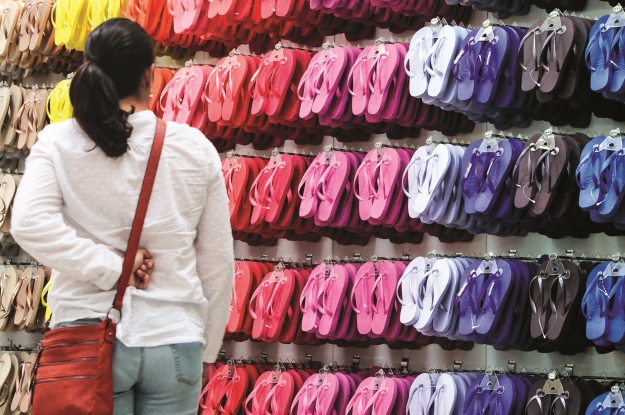Havaianas is to Brazil what Apple is to the United States. More than a pair of flip-flops, they are part of the country’s self-image, a product that embodies the idea of Brazil as a carefree country of surf, samba and soccer.
So the distressed sale in November of Havaianas’ parent company, Alpargatas S.A., was symbolically important. It underscored a recent flurry of deal-making in Brazil’s biggest industries, shed light on who is buying and who is selling in the current crisis — and also provides a hopeful vision of where the economy might be headed in coming years.
With 218 million pairs sold in 2014, Havaianas are widely regarded as the world’s most popular flip-flops. Dominique V. Turpin, a professor of marketing at the International Institute for Management Development in Switzerland who has studied Havaianas and dissected its growth strategy, said the company deftly played what he called the “piano of innovations” with unique designs, customer involvement, distribution, pricing, communications, and public relations.
“Every time I go to Brazil, I can’t resist visiting a Havaianas store and it’s rare that I leave empty-handed,” Turpin told AQ via email. “The hotel where I usually stay in São Paulo also provides Havaianas in the room instead of slippers (smart!).”
Riding this popularity, Alpargatas S.A. was a top investor pick for Brazil as recently as 2014. So why was the company sold in a distressed transaction less than a year later? It starts with a look at the seller, Camargo Corrêa SA.
Camargo is a São Paulo-based holding company known primarily for its eponymous construction and engineering business. When this edition of AQ went to press, the company had not yet reported its 2015 financial statements. But many were predicting grim results. Amid the nation’s worst recession since 1901, construction firms across Brazil are suffering from a pullback in infrastructure investment. Camargo also agreed in 2015 to pay more than 800 million reais ($200 million) in fines and indemnities related to its role in a corruption scandal at state oil firm Petrobras.
Many companies involved in the Petrobras scheme are being forced to raise cash, said Maurício Tanabe, a lawyer in the São Paulo office of Tauil & Chequer Advogados, a law firm. “It has affected the reputation and day-to-day business of these companies; they’re obliged to sell these assets.”
It is a different story for Havaianas’ buyer, J&F Investimentos S.A. J&F is the holding company of São Paulo-based JBS S.A., the world’s largest meat exporter (and owner of American chicken producer Pilgrim’s Pride). JBS has avoided implication in the so-called Lava Jato probe circling Petrobras, and benefitted in some ways from Brazil’s down economy: JBS made more than $3 billion last year by hedging against the depreciation of the real.
The falling real (which has lost nearly half its value since mid-2014) and relatively strong prices abroad for its food products (unlike the low prices for oil and metals) means JBS is effectively paying its Brazilian workers less in dollar terms while profiting more in real terms.
JBS is one of few Brazilian companies able to make acquisitions right now. Those buying up Brazilian assets are typically foreign and increasingly Japanese and Chinese, according to Tanabe, who sees the heaviest deal-making happening in the distressed sectors of oil and gas, construction and engineering, and real estate. “I believe the second semester we will have some real estate price adjustments that will be attractive for foreign investors,” Tanabe said.
Other deals have included U.S. cosmetics company Coty’s $1 billion purchase of the personal-care and beauty division of Brazil’s Hypermarcas SA in November, and China Three Gorge’s $3.44 billion purchase of two hydroelectric dams on the Paraná River in January. Thanks to this recent flurry of deal-making, Brazil had one of its best-ever fourth quarters for mergers and acquisitions since records began in 1995, according to financial data firm Dealogic.
Buyers should be ready for more short-term pain in Brazil’s economy, which contracted 4.1 percent in 2015 and is forecast to shrink another 3.45 percent this year. Consumer confidence remains near an all-time low. Havaianas, for one, felt a 7.3 percent decline in the number of sandals sold last year in Brazil, and a 1.4 percent decline internationally, according to the company’s financial results.
On the other hand, the path to an eventual recovery probably lies with companies like Havaianas that represent the best of Brazilian creativity and entrepreneurship.
“We do have to have some corrections with the economy, but I believe at the start of 2018, maybe the end of 2017, we will have a better situation in relation to now,” said Tanabe. “But we believe things will get worse before they get better.”
As for Havaianas, Professor Turpin advised the new owners to “leave them alone and keep investing.”
“Havaianas truly embodies the ideals of Brazil,” Turpin added. “Therefore, it was good that the company was sold to another Brazilian company rather than a Chinese (one).”
—
Kurczy is a special correspondent for AQ.





